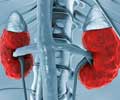Heartburn drugs like proton pump inhibitors are linked to gradual kidney damage, reveals study.
Highlights
- Proton pump inhibitors (PPIs) like omeprazole, lansoprazole are popular heartburn drugs used in the treatment of ulcers and acid reflux.
- Heartburn drugs can result in a gradual //and silent kidney damage.
- Kidney problems may be a warning sign for doctors to discontinue the proton-pump inhibitors.
Around 15 million Americans who suffer from heartburn, ulcers and acid reflux are prescribed with proton-pump inhibitors that bring relief by reducing gastric acid.
Most of the people take this as an over-the-counter drug without the doctor’s notice. Lansoprazole (Prevacid), Omeprazole (Prilosec), Esomeprazole (Nexium) and Pantoprazole (Protonix) are some of the proton pump inhibitors that are being sold commonly for treatment.
More than half of the 125,000 patients who developed chronic kidney damage by taking heartburn drugs did not have any acute kidney problems before. This means that they were not aware of any decline in their kidney function.
Doctors and patients who take PPIs should be aware of the consequences. However, Ziyad Al-Aly, MD, the study’s senior author and assistant professor of medicine at Washington University School of Medicine, said that the onset of acute kidney problems might not be reliable to detect a decline in kidney function among patients who take PPIs.
The research study may include first author Yan Xie, a biostatistician at the St.Louis, analyzed data from the Department of Veteran Affairs database on 125,596 cases as new users of Proton pump inhibitors. And 18,436 heartburn drugs which were referred to as H2 blockers. These people were less likely to cause kidney problems and were ineffective.
People with chronic kidney damage and end-stage renal disease associated with PPI use were found to occur in people without acute kidney problems.
While, in H2 blockers, 7.67% of people developed chronic kidney disease in the absence of acute kidney problems and 1.27% people were found to develop end-stage renal disease where they can no longer remove the waste products from the body. These patients may require either a dialysis or end-stage renal disease.
Al-Aly, Va’s associate chief of staff for research and education, VA’s Clinical Epidemiology Center, said, "Doctors must pay careful attention to kidney function in their patients who use PPIs, even when there are no signs of problems."
"In general, we always advise clinicians to evaluate whether PPI use is medically necessary in the first place because the drugs carry significant risks, including a deterioration of kidney function."
Proton-Pump Inhibitors (PPIs)
Proton-pump inhibitors are drugs that act by reducing the amount of stomach acid that is produced by the glands in the lining of the stomach.
Indications
- Relieves symptoms of gastro-esophageal reflux disease//
- Treats peptic ulcers
- Helps to treat the damage caused by acid reflux
- Headache
- Diarrhea
- Itching
- Constipation
- Nausea
- Yan Xie, Benjamin Bowe, Tingting Li, Hong Xian, Yan Yan, Ziyad Al-Aly. Long-term kidney outcomes among users of proton pump inhibitors without intervening acute kidney injury. Kidney International, February (2017);DOI: 10.1016/j.kint.2016.12.021
- Proton pump inhibitors - (https://medlineplus.gov/ency/patientinstructions/000381.htm)
Source-Medindia















